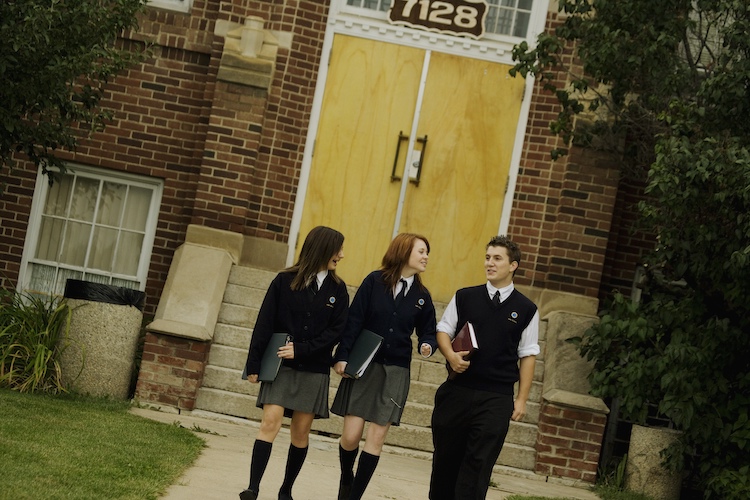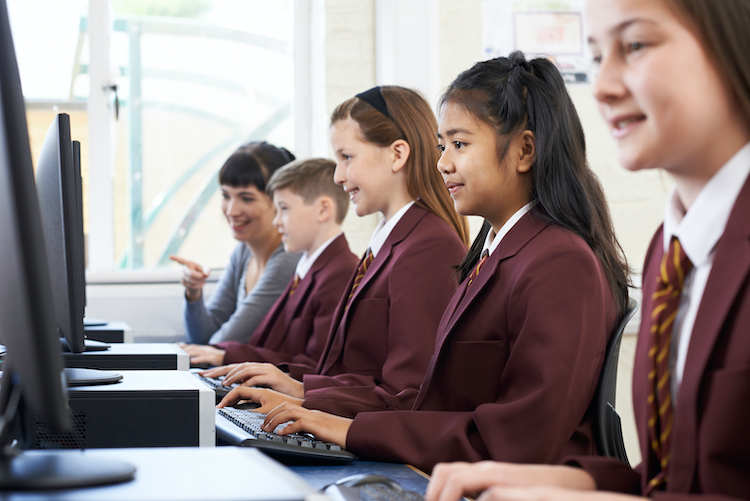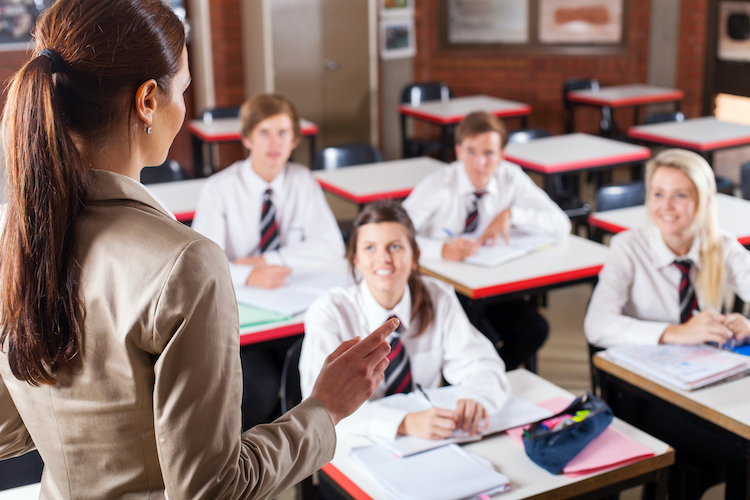
Are you currently choosing a school and wondering is private school worth it? If you’re new to the private school sector, it can be hard to know what to expect. So, what do you need to know – that private schools might not tell you?
Most private schools will have a wonderful prospectus. You will definitely take a tour of the school with the head teacher. Many schools will have taster days for prospective students, so they can get a feel for the school. You may need to take an interview (this book has some great tips). But if you’re new to the private education sector (as we were) there are still some things that might take you by surprise.
My daughter is in her 12th year at private school. She attended pre-school at a local private school and liked it so much she stayed on for primary and then secondary school. We did try a different secondary school for Year 7, but moved back to the original school in Year 8. My daughter is now in Year 11 and sitting her GCSEs.
The plan is to take our child out of private school next year. I am really happy with her school, I just don’t think it’s the best idea to send her off to university having only ever experienced the (frankly) pampered world of private education.
With our experience in mind, here are ten things you need to know about sending your child to a private school:
10 Things Private Schools Won’t Tell You


1. There are rich kids
Some of the kids at private school (not all) will come from wealthy families. The first time one of Flea’s friends came for a sleepover, she stood in our garden and innocently asked me, “Where is your garden?” I had to explain that this is what gardens look like when you live in a Victorian terrace.
I didn’t want Flea to ever mistake our lack of 50 acres or a second home in Florida as being “poor”. I was always very clear that a) by most people’s standards we are pretty comfortably off, and b) those wealthy friends often don’t have the freedom and leisure time together that we enjoy. A lot of kids at Flea’s school have parents who work overseas, who have huge business commitments, or who had to employ PAs to do the school run.
2. The holidays are different
When I’m asked is private school worth it, I immediately think about the holidays. State school children in the UK will get 13 weeks holiday each year. In private school, it’s usually more like 18 weeks. This includes a summer break of at least nine weeks.
This means our family can take longer holidays from early July, when flights and resorts are quieter AND cheaper. If you’re working, though, you’ll need to think about how you’ll manage longer summer, Easter and Christmas breaks.
3. They do great during pandemics
Is private school worth it? The answer is a definite yes when the world turns upside down. The pandemic has been a terrible thing for everyone, but it’s fair to say that private school kids have been more cushioned than most. When we first went into lockdown, Flea’s school created a full timetable of virtual lessons within 24 hours.
Flea attended online school from 9am to 4pm, five days a week. There were virtual fitness classes, competitions, video assemblies and even homework. The school shut in June and then opened early for autumn, giving the children a month more in school than the local state schools.
Of course, private schools needed to do this to justify still charging fees. But as a parent, I was just hugely appreciative to the school and its staff for what seemed like heroic efforts for the students. I credit the school with helping my daughter to continue her education in incredibly hard circumstances, and get a great set of GCSE mock results.
3. Sports is a big deal
Most private schools allocate an afternoon each week to games. Also they will often allow kids to miss classes for matches or tournaments on other days. You can expect a huge focus on extra-curricular activities, and access to top-notch coaching and sports facilities.
That said, it’s worth noting that some private schools can be ruthlessly selective. Kids who make the national squad and win trophies look good in the prospectus. A child who just enjoys hitting a ball with their friends could find themselves somewhat overlooked in some schools. When visiting a private school, ask what percentage of kids participate in sport outside of games lessons. In some state schools this figure could be as high as 90%, in some private schools my guess is it’s more like 20%.
4. There’s less tolerance of misbehaviour
Those lovely manners you see when you visit a private school aren’t there by accident. For one thing, it’s a lot easier for teachers to control kids when there are only 10-20 of them per class. But private schools are also notoriously willing to expel students who don’t meet the discipline code.
We know a whole bunch of kids who have been kicked out of private schools, usually for fighting or drugs. This isn’t to say that kids in private schools are better behaved – there’s fighting and bullying and disruption in all schools. But in an independent school, it’s less likely to be visible and ongoing. The exclusion process is far less regulated in the independent sector, so schools will generally expel or ask parents to withdraw children who are disruptive. Side note: private school kids have more money and that can translate into more drugs, more often.


5. The school trips are fancy
When I was at school, school trips might be a coach trip to the Lake District, or a ferry trip to France if we were lucky.
At Flea’s school, there’s been a ski trip to Canada, a hockey tour of Barbados, and a photography trip to Tokyo. Also geography trips to Africa, and rugby tours of Australia. It’s not unusual for school trips to cost between £1,000 and £2,000. And on top of that we had to find £500 for a semi-compulsory pre-season hockey coaching camp run by two Team GB athletes.
If you’re considering sending a child to private school, think about how much your child might want to join in with these experiences, how important they are in terms of socialising, and whether you can afford them.
6. The uniform is extortionate
Forget Tesco and M&S. At my daughter’s school, all the uniform needs to come from the school shop, and it won’t be cheap.
Just buying the basics of a skirt, shirt, blazer and jumper costs almost £150. Add to that shoes, bags and coat and the uniform for Flea’s school came to just over £350. Then we spent another £300 on sports kit because apparently you can’t do PE without shorts, skirt, top, hoodie, tracksuit, waterproof jacket, athletics vest AND leggings, all packed in a monogrammed regulation sports bag. All sports kit is bespoke to the school, most is made by Under Armour, and 50% of it will be lost in the first two weeks of term.
Top tip? The December before your child starts at school, find out if there’s a sale at the Christmas fete or a second-hand sale run by the Friends of the School.
7. You’re a customer now
One thing I have noticed about private schools is that they are pretty happy for you to get in touch if you’re at all concerned, and those concerns tend to be taken seriously, and dealt with promptly.
When I have had worries, I don’t usually have a problem getting in touch with a teacher directly, or with the head of year, deputy head or headmaster if required. There’s something nice about the teachers knowing all the kids and parents, and it feeling like a community that (mostly) looks out for each other.
Smaller class sizes mean I can expect all of my daughter’s teachers to know her well, and to let me know quickly if they have any concerns. I know lots of parents who have told me their children have been overlooked in the state system, and they particularly value the smaller class sizes and more individual approach that private schools can offer.
That said, there is still a hierarchy of parents at private school and if you’re not going to attend the Ladies Lunches or the Friends of the school fundraising meetings, then prepare yourself for a few years of being bottom of the school-gate ladder.
8. They don’t have to follow the national curriculum
In the UK, state schools need to follow the national curriculum and hold regular tests, known as SATs. Many private schools don’t do these tests, and will mix and match the curriculum based on their view of what is important.
One of the schools my daughter attended didn’t do any testing at all during primary school. This wasn’t a problem for me, since I don’t think testing is helpful at this age. Besides, since my daughter was in a small class of 11 children, the teacher knew very well what her strengths and weaknesses were. One downside of this, though, was that when my daughter went into secondary school and sat her first ever exams, she found it ridiculously stressful.
9. But they are inspected
While private schools aren’t inspected by Ofsted, they are inspected by a body called the ISI (Independent Schools Inspectorate). These reports are carried out every 3-6 years. Parents will be contacted ahead of the inspection and asked to give their impressions or mention any concerns. The results will then be published on the ISI website, and should also be available through the school website. This guide to independent schools also provides a useful overview of many of the UK’s private schools.
10. What does private school really cost?
School fees will likely cost between £10,000 and £20,000 a year for a private school. You’ll typically get 5% off if you send more than one child, and in some cases you’ll get 10-20% off if your child qualifies for a sport, music or academic scholarship. Some private schools offer bigger discounts in sixth form for academic success.
When calculating if you can afford private school, though, consider ALL the expenses. In our case, it wasn’t just fees and uniform and school trips we had to think about. At secondary school in particular, you also need to think about the “fitting in” cost. When you’re 13 it matters that everyone has a designer school bag and the latest Airpods and iPhone.
When the kids in my daughter’s school go out on a Saturday, they don’t go to Top Shop and McDonalds, they go to Selfridges and The Ivy, wearing Gucci trainers and carrying a Louis Vuitton handbag. As adults it’s very easy to say this stuff doesn’t matter, but when you’re a teenager looking to fit in and make friends, sometimes it really does.
So is private school worth it?
If you’re wondering is private school worth it, or if a private school is better than a state school, the answer is.. it depends what you expect from private education.
For me, a private education guarantees you some things. If your child goes to private school they will have every opportunity to succeed if they work hard. They will not need to compete for resources, or struggle because the library doesn’t have enough books or computers.
At private school, they will have teachers who get to know them really well, and have the time to nurture their abilities. They will be in an environment that places a high value on manners, good behaviour and hard work. They will gain experiences that may not be available in a state school, whether that’s travel, sport, or other extra-curricular activities.
The flip side is that they may be exposed to values and ideals that don’t match the ones in your home. Some kids will be materialistic, and at some private schools, you might be shocked (or not) at the levels of racism and homophobia. If you are stretched to pay fees, your child may feel deprived or embarrassed by not having all the things their friends have.
The truthful answer is that private school is worth it only if the school is the right school for your child. For us, I chose a private school because I know my child can be a little quiet, and I worried she would be lost in a large school with 30+ kids in a class. As a single parent, I liked the extended care available in private school, and the flexibility to allow us to travel during term time when Flea was younger.
You’ll know whether your child will thrive in a busier or quieter school, a school with a faith element or a strong focus on a particular sport, or academic area. So rather than asking if private school is better than state school, I’d advise just asking whether School A is better for your child and family than School B.
What do you think?







Always fascinating to compare state and independent sector. Rather like you say it’s more a case of whether the school is the right one for your child regardless of sector and it never ceases to amaze me how much snobbery there is against private schools. One thing I’ve noticed about private schools is that kids build up friendship groups that seem to last a lifetime. You don’t necessarily get that in the state sector (just one point of accuracy if you’ll forgive me, academy schools don’t have to follow the national curriculum so it’s becoming rarer and rarer in the state sector).
That’s very interesting about academies – do they need to do SATs? One of the things I liked about private is the no-testing, which seemed (at the time) to be universal for state schools.
I agree that with independent schools you do often end up with lovely friendships, because the kids are together from 3-18, so it’s a very safe, familiar community. Especially if they board, or spend a lot of time together through sports etc. That said, I didn’t want Flea to ONLY experience that and then find herself at uni in two years with no idea how to make new friends, so we will probably move her to another school or a sixth form college for a-levels.
I had the best of both worlds, going to state primary and secondary then public school for 6th form – mainly because my school didn’t have a 6th form then, and the options were terrible. Thankfully I got a music scholarship and it was then topped up due to my mum’s income. I agree with everything you’ve got in here. My private school wasn’t the most academic compared to grammar schools or even some really good state schools, but the facilities and continued opportunities for sports and music which I couldn’t have continued at 6th forms elsewhere were amazing. We had a lot of kids expelled for drugs, and at the time we could drink underage with 5th year and up able to have up to 3 drinks at house parties, with a 6th form bar you could go to from the term after you were 17. They’re certainly different worlds, but they certainly serve a purpose for the families that use them. I think a lot of people who’re against them, don’t realise that it’s not all just rich kids, but you see a total mix of children at many of them and that children also need to work hard still to get the grades they do get. And nowadays, often harder when applying for some uni places compared to equivalent state school pupils.
When my sister was deciding on private or state schools for her three sons for secondary school, there were obviously a number of factors. They were lucky enough to have a great state secondary school nearby and the boys were all academically smart. The clincher was that the money spent on private education could be used for amazing family experiences and that sort of travel is an education in itself. They also worked out that the money they saved meant they could afford private tutors if necessary in any or all subjects in order to pass GCSE’s when the time came. In the end they didn’t need any tutors because the school invested a lot of effort in pupils who could bolster their already good reputation by going to good universities. And I think, the universities are mindful to accept a fair number of state school students so sometimes these pupils get a better deal for uni entrance.
Thanks for a very interesting read. I was just wondering if you had any thoughts on diversity in private schools? In your experience, are children still able to mix with students of a range of different cultural and socio-economic backgrounds? I think it’s important for children to leave school as well-rounded individuals, and I worry that only interacting with people from a similar background – and spending Saturdays at the Ivy – might inhibit this.
I do! The area we live in is not particularly diverse and having lived in Brighton and London before we moved here, it was something I really noticed when we arrived. The local state schools were not racially or culturally diverse at all. In that respect, the private schools, which drew international pupils, were significantly more diverse.
We’ve had very different experiences at different schools in terms of diversity around learning disability and LGBTQ issues, for example. So I suspect those things are school-specific, with some schools having great inclusion and strong policies, and others being a bit slower to catch on.
With three school aged children, two with special educational needs I never even considered a private school. It definitely sounds like you made the right choice for Flea though.
Interesting and fascinating read! I have been to both sectors myself. I went to secondary private for couple of years and then moved to a state school due to family circumstances. I found the quality of teaching poor overall in my state school, it was a complete shock to my system! I found it almost impossible to cope with the change, absolutely hated the experience.
I have twin girls at 7 it does bother me that they are at a state school. I know it sounds really pathetic, but I do sometimes think that perhaps they will thrive more at a more nurturing environment. But then I would think perhaps they can build up their resilient at a state school just to make myself feel better.
We are not wealthy, but can just about stretch it if did send them private. The reason we didn’t is because of what you said- we don’t want them to feel deprived!! We will have to buy iPhones, Gucci shoes and Lv bags (times 2!) as well as finding the extra £1000-4000 for school trips! Instead, we give them all the support and experiences they need/want outside school. They can learn whatever they want base on their interests, and go to quality holiday clubs as well as nice family holidays.
Having said that, we would have definitely gone for private sector if we have more earnings or if we only have one child.
The private school debate is an issue that many people take seriously. Some argue it’s worth the financial investment, while others claim there are too few benefits to warrant high tuition rates and exorbitant fees for extracurricular activities. Regardless of which side you may be on, one thing remains certain: a quality education can only do so much good without parental involvement in some capacity or another through volunteering time at their child’s classroom every day after work hours until 6 p.m., spending money out-of-pocket to provide supplies they need each year like new pencils and notebooks (or even just donating cash), as well as ensuring parent participation in PTA meetings if not also getting involved with them right from home.
Great article – giving plenty of food for thought. I read it assuming that private meant private day school (non boarding).
I would be interested to understand if you found a particular period of your child’s education that offered a better bang for buck by going private?
I’m approaching that with the thought that junior state school education could be on an equal footing and the bigger/busier classes less problematic until middle/senior school when disruptive kids begin to emerge.
Thanks
Hi Jack
Personally, I felt the benefits of private in the primary years were – no SATS which allows for more time teaching, less time being tested. Smaller classes so better support for children who might be a bit quieter. Extended hours, which were important for me as a single, working parent, and the ability to take my daughter out of school without being fined – again, important because my job involved a lot of travel, and I took my daughter with me. It was a really nice experience all round, with the ability for my daughter to learn things like French and latin, take part in a wider range of sports and trips etc.
At secondary, it’s more about the academic side, probably. More resources, more extra-curricular opportunities, more modern facilities. The disadvantages are that it can be materialistic, and expensive if you want your kids to fit in and have what other kids have (which they don’t mind so much at primary but matters once they’re teens)
I went to an independent grammar school, I didn’t want to, I even tried to fail the entrance exam, not by too much so that it looked obvious, but just by enough but all that happened was that I did myself out of a scholarship. As Mum and Dad were not well off, I did qualify for a bursary which covered a lot of the fees. I never felt that I fit in, there was very much a ‘them and us’ divide between the well-to-do families and those on bursaries.
I enjoyed some subjects, but not others, but that could have happened anywhere. There was a lot of sport, one 40-minute lesson and one 2-hour afternoon session every week which, apart from swimming, I did not enjoy.
I tried to hide away and make myself invisible all the time I was there, and I have continued to do so ever since. I don’t know if it would have made a difference going to a ‘normal’ school, but I have always thought that I might be a different person if I had. I recently told my mother how I actually felt about school, to which she replied ‘Well you chose to go there’, and she is correct, out of the choice I was given (the school I went to was part of a two-school foundation and I was offered a place at both of them) I did pick the one that I saw as the lesser of two evils, but it was not where I actually wanted to go.
I only keep in touch with a couple of people from secondary school, I have more contact with people I went to Junior school with.
It’s like everything in life, private school will not suit everyone, it’s just an expensive experiment if it doesn’t, but I guess it can pay dividends for the right person.